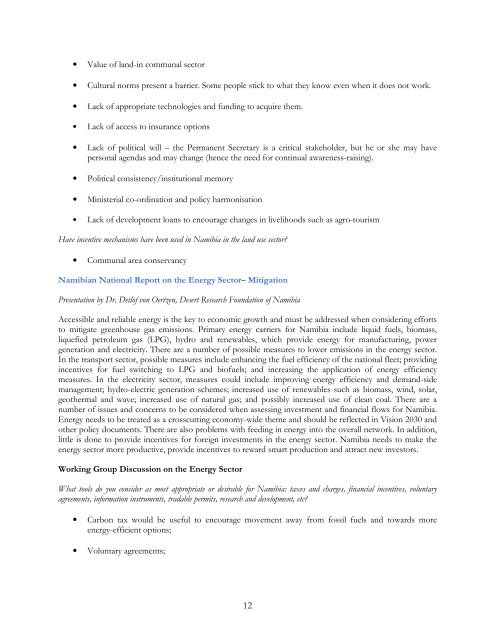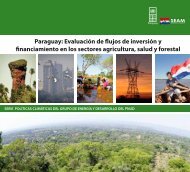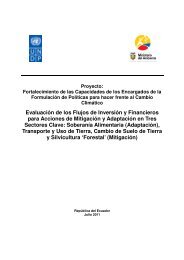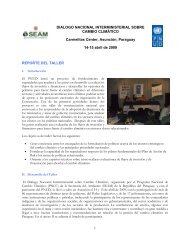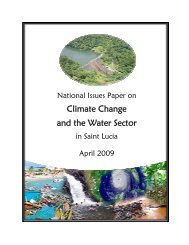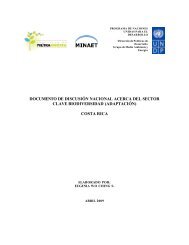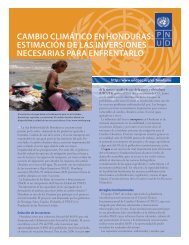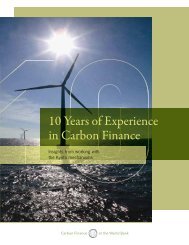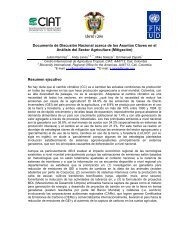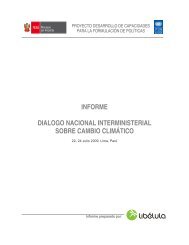national climate change awareness-raising workshop - UNDPCC.org
national climate change awareness-raising workshop - UNDPCC.org
national climate change awareness-raising workshop - UNDPCC.org
You also want an ePaper? Increase the reach of your titles
YUMPU automatically turns print PDFs into web optimized ePapers that Google loves.
• Value of land-in communal sector<br />
• Cultural norms present a barrier. Some people stick to what they know even when it does not work.<br />
• Lack of appropriate technologies and funding to acquire them.<br />
• Lack of access to insurance options<br />
• Lack of political will – the Permanent Secretary is a critical stakeholder, but he or she may have<br />
personal agendas and may <strong>change</strong> (hence the need for continual <strong>awareness</strong>-<strong>raising</strong>).<br />
• Political consistency/institutional memory<br />
• Ministerial co-ordination and policy harmonisation<br />
• Lack of development loans to encourage <strong>change</strong>s in livelihoods such as agro-tourism<br />
Have incentive mechanisms have been used in Namibia in the land use sector<br />
• Communal area conservancy<br />
Namibian National Report on the Energy Sector– Mitigation<br />
Presentation by Dr. Detlof von Oertzen, Desert Research Foundation of Namibia<br />
Accessible and reliable energy is the key to economic growth and must be addressed when considering efforts<br />
to mitigate greenhouse gas emissions. Primary energy carriers for Namibia include liquid fuels, biomass,<br />
liquefied petroleum gas (LPG), hydro and renewables, which provide energy for manufacturing, power<br />
generation and electricity. There are a number of possible measures to lower emissions in the energy sector.<br />
In the transport sector, possible measures include enhancing the fuel efficiency of the <strong>national</strong> fleet; providing<br />
incentives for fuel switching to LPG and biofuels; and increasing the application of energy efficiency<br />
measures. In the electricity sector, measures could include improving energy efficiency and demand-side<br />
management; hydro-electric generation schemes; increased use of renewables such as biomass, wind, solar,<br />
geothermal and wave; increased use of natural gas; and possibly increased use of clean coal. There are a<br />
number of issues and concerns to be considered when assessing investment and financial flows for Namibia.<br />
Energy needs to be treated as a crosscutting economy-wide theme and should be reflected in Vision 2030 and<br />
other policy documents. There are also problems with feeding in energy into the overall network. In addition,<br />
little is done to provide incentives for foreign investments in the energy sector. Namibia needs to make the<br />
energy sector more productive, provide incentives to reward smart production and attract new investors.<br />
Working Group Discussion on the Energy Sector<br />
What tools do you consider as most appropriate or desirable for Namibia: taxes and charges, financial incentives, voluntary<br />
agreements, information instruments, tradable permits, research and development, etc<br />
• Carbon tax would be useful to encourage movement away from fossil fuels and towards more<br />
energy-efficient options;<br />
• Voluntary agreements;<br />
12


